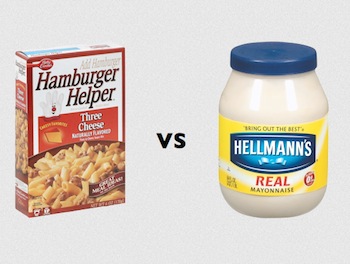Are you a chef or a cook in the classroom[1]?Cooks dutifully follow recipes, but chefs pour their humanity into their work and create works of art. Cooks follow the map made by chefs. For as long as there have been chefs willing to share their recipes, there have been cooks complaining that they didn’t work[2].
Last week I read an article about Michael Wesch in the Chronicle called, “A Tech Happy Professor Reboots After Hearing His Teaching Advice Isn’t Working.” Wesch is renowned for using technology in his classes and up until recently he was vocal advocate for expanding the use of technology in his classes. According to the article Wesch has reconsidered the role of technology in the classroom after hearing complaints from many who tried to implement his methods. It appears his pedagogical innovations weren’t easily replicated.
The article then abruptly pivots to a section called “Learning From an ‘Old Fogy’” that profiles the 100% technology free teaching style of Christopher Sorensen. We learn from this ‘Old Fogy’ that teaching isn’t about wis-bang techno-media, but rather its about creating a human connection with your students and subsequently creating a sense of community. Sorensen argues that teachers lead their students by being passionate advocates for their discipline; when students see how cool their teachers think the subject is, they can’t help but get intellectually excited about it.
The piece wraps up with Wesch saying:
“Students and faculty have to have this sense that they can truly connect with each other,” he concludes. “Only through that sense of connection do you have this sense of community.”
What I hear Wesch and Sorensen saying is successful teachers are chefs in the classroom. There is no off-the-self technology that you can adopt to make you an excellent teacher. This doesn’t surprise me nor should it you. As I’ve argued before, what makes great teachers great is that they bring their humanity into the classroom and teach passionately. This piece, and perhaps Wesch, make the mistake of thinking it was ever possible to replace humanity with technology in the first place.
Technology will never replace human connections between students and teachers because it simply can’t. However, technology can be used to unburden teachers from monotonous tasks so that they will have more time to engage with students and develop real human connections.
Hey Publishers I Want Hellman’s Mayonnaise
The challenge of turning Wesch’s innovations into off-the-shelf plug-and-play classroom solutions should be a lesson to publishers everywhere. Great classes can’t be “deployed across the enterprise”, so stop trying.

You can break publisher resources into two groups: Hamburger Helper and Hellman’s Mayonnaise. Many chefs love using Hellman’s because it saves them from the monotonous chore of making mayo and the quality is high enough that even the most developed of palates can’t detect the shortcut. With this handy time saver chefs are free to spend their time making master pieces.
Hamburger Helper on the other hand is a paint-by-numbers dinner in a box- standardized and soulless. Many of the products publishers offer educators are closer to Helper than they are Hellman’s. “But we let you customize,” publishers may be saying right now. That’s a step in the right direction, but chefs don’t customize box dinners, they make culinary art.
How Does This Article Relate to SociologySource?
A number of friends and readers sent me the Wesch article asking for my opinion and some asking, “does this change how you see the value of your site”? To address the later question, no it doesn’t. SociologySource is a place to share experiences and reports from trial-and-error learning. I hope that you’ll be inspired to use the activities and ideas shared here, but if you are looking for off-the-shelf plug-and-play solutions for your classroom, we will probably disappoint.
If you are reading this blog I’m guessing that you are a chef or at least aspire to be. I started SociologySource to let you into “my kitchen” in the hopes that if I shared my struggles and successes, you would too. I wanted to build a community of sociology chefs and am honored that so many of you have given me a piece of your time.
-
The social distinction between chefs and cooks has historically involved racial, class, and gender inequality with white men disproportionately being recognized as chefs. I am using the distinction for metaphorical purposes with the hope that we can remove the racial and gender components. Outstanding teaching has no allegiance to any race, class, or gender. ↩
-
If you are reading this blog, my guess is that you are either a chef in the classroom or an aspiring chef. Every time I walk into the classroom I try to make art, but the key word in this sentence is try. I’m still learning- still failing. But hey, that’s true of art regardless of the medium. I have a strong opinion in this post, but I hope that no one reads this first paragraph and feels denigrated in any way. I’ll say this again at the end of the post, but I didn’t want you to have to wait until then to hear this. ↩

Comments 1
Gabriela Allen — March 5, 2012
your website is more like the spice section where we can get that special ingredient that might just give it the POW to the lecture, thanks!!!!